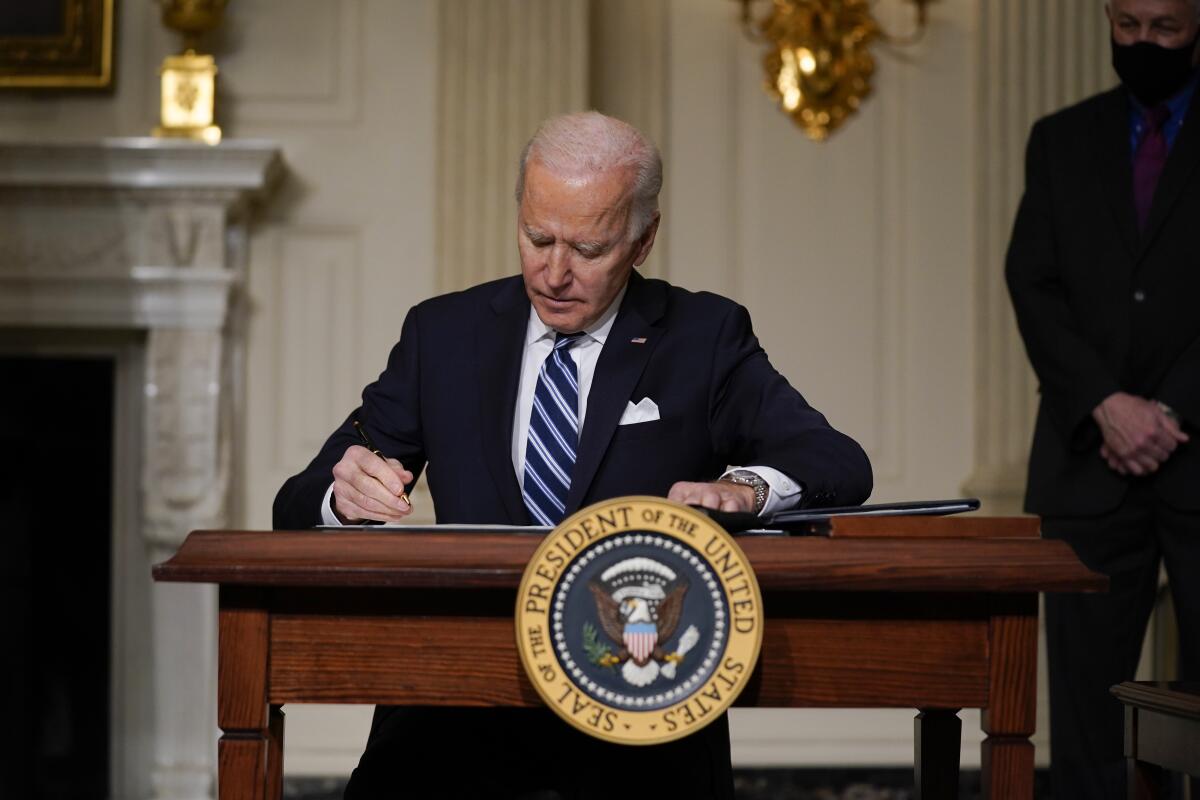Column: Can quiet Joe be just as compelling as outrageous Donald?

Weâre three weeks out from an attempted coup at the U.S. Capitol under the flag of Donald Trump. Republican leadership has closed ranks around the disgraced ex-president. Coup enthusiast Sen. Josh Hawley (R-Mo.) is mewling about wokeness. And among the more floridly batty coup stans, Rep. Marjorie Taylor Greene (R-Ga.) has been caught gunning in past Facebook posts for the assassination of Nancy Pelosi.
Oh, and thereâs also the frenzy over GameStop, Reddit and Robinhood â a fable of shrewd youth and bearish hedge funds. If you havenât tried to grok that one yet, youâre probably too late to capitalize, so let it slide.
All the while, almost beneath notice, President Biden has been doing his job. The brand-new president is a little more than a week into his first 100 days, and heck if he hasnât been faithfully executing the office of president of the United States.
Itâs tempting to say that Bidenâs White House is promising only for what itâs not: the benighted reign of his predecessor. It certainly is quieter. One of the logos of Bidenâs first month in office should be the Unicode âundoâ symbol.
But the president and the vice president havenât just been undoing Trumpian damage. Theyâve been sticking to their plan, and notching daily wins for the nation with little fanfare.
Time to leave the tabloids for the white papers, as hard as it might seem to pull yourself away. The white papers are where the big news is now.
On his first full day in office, Biden had the United States recommit to the World Health Organization and rejoin the Paris agreement on climate change. This was not vacant virtue-signaling. In partnership with the WHO, the U.S. can collaborate on global effort to recover from the pandemic.
As for the move back to the Paris accord, the U.S. is once again party to a legally binding international treaty in which all signatories commit to keeping annual global warming under 3.6 degrees Fahrenheit. States in the U.S. not yet committed to aggressively reducing greenhouse gas emissions are now under federal pressure to do so, and fast. On Thursday, perhaps by coincidence or perhaps not, General Motors announced a plan to phase out traditional cars and sell only zero-emissions vehicles by 2035.
Biden also quickly ordered the nation on to COVID-19 âwartime footing,â committing the federal government to expanding testing and vaccination and reversing discrimination in diagnosis, treatment and inoculation. This weekâs plan: enough doses to vaccinate 300 million Americans by summerâs end. With these policies, Biden isnât undoing anything. The Trump forces had done so little to coordinate an all-around national response to the pandemic, Biden had nothing to undo.
On Day 2, the administration brought the White House press briefing back to life with Jen Psaki, his level-headed White House press secretary. Shortly thereafter, Psaki was joined by Anthony Fauci, Bidenâs chief medical advisor. As Fauci reflected on the bind heâd been in to repress his insights while working for Trump, he too seemed revivified for the COVID battles to come.
The daily briefings at the White House, and at the State Department as well, have shored up the authority of the Biden-Harris administration, and point to the fact that the Trump administrationâs resistance to formal briefings was foolhardy. âPrior governments didnât brief to throw a bone to the press,â media critic Jay Rosen pointed out on Twitter. âStanding there was a scene of power.â
On the Friday after his inauguration, Biden gave an address on the economic crisis, laying out his administrationâs commitment to direct financial, rent, mortgage and eviction relief. These moves are part of an extensive Biden-Harris plan, drafted with the blessing of economists across the political spectrum, to build back to full employment. Biden issued an executive order the same day to restore some collective bargaining rights and promote a $15 minimum wage for all federal employees.
This week, Biden reaffirmed the century-old law â touted but flouted by the Trump administration â that government expenditures for infrastructure and defense, including the hundreds of billions spent on procurement, go to American companies and workers.
The list goes on: The ban on transgender people in the military, repealed. Ditto the so-called Muslim ban. Susan Rice, head of the Domestic Policy Council, introduced pragmatic reforms of institutions where systemic racism has created unemployment, poverty, hunger, disenfranchisement and disease among people of color.
Biden also reupped Americaâs commitments to its allies, especially NATO, and once again classified Vladimir Putinâs Russia as a hostile foreign power. They had a talk and even agreed to extend the last remaining U.S.-Russia nuclear arms treaty. But Biden also confronted Putin about the poisoning and torture of the Russian opposition activist Alexei Navalny, and Russiaâs extensive SolarWinds hack. The readout was packed with allusions to the fact that the new president doesnât consider Putin to be in the running, as Trump once did, to be his ânew best friend.â
In the margins, Biden has also posted corny but welcome house rules on tone, courtesy and goodwill meant to combat cortisol poisoning in politics.
Almost as quickly as Biden is acting now, Donald Trump unveiled aggressive violations of American well-being, and he kept at it for four years of mayhem. And itâs now common to praise Biden for, above all, bringing normalcy and even tedium back to the federal government.
I get that. But once the burlesque clamor of the last administration fully recedes from memory, we may discover that disciplined, focused and enlightened action for the greater good is way more compelling than weâd remembered.
More to Read
A cure for the common opinion
Get thought-provoking perspectives with our weekly newsletter.
You may occasionally receive promotional content from the Los Angeles Times.










